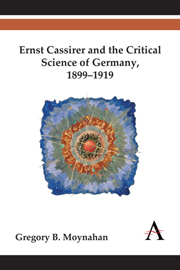Book contents
- Frontmatter
- Dedication
- Contents
- Acknowledgments
- List of Abbreviations
- Introduction “Reading a Mute History”: Ernst Cassirer, the Marburg School and the Crises of Modern Germany
- Part I The Marburg School and the Politics of Science in Germany
- Part II Critical Science and Modernity
- Chapter Four Leibniz and the Foundation of Critical Science: Leibniz's System in its Scientific Foundations (1902)
- Chapter Five Science and History in Cassirer's Substance and Function (1910)
- Part III Liberal Democracy and Law
- Conclusion Critical Science, the Future of Humanity and the Riddle of An Essay on Man (1944)
- Index
Chapter Four - Leibniz and the Foundation of Critical Science: Leibniz's System in its Scientific Foundations (1902)
from Part II - Critical Science and Modernity
Published online by Cambridge University Press: 05 September 2013
- Frontmatter
- Dedication
- Contents
- Acknowledgments
- List of Abbreviations
- Introduction “Reading a Mute History”: Ernst Cassirer, the Marburg School and the Crises of Modern Germany
- Part I The Marburg School and the Politics of Science in Germany
- Part II Critical Science and Modernity
- Chapter Four Leibniz and the Foundation of Critical Science: Leibniz's System in its Scientific Foundations (1902)
- Chapter Five Science and History in Cassirer's Substance and Function (1910)
- Part III Liberal Democracy and Law
- Conclusion Critical Science, the Future of Humanity and the Riddle of An Essay on Man (1944)
- Index
Summary
“Leibniz's Metaphysic,” Cassirer writes in Leibniz's System, “is the first complete expression of the consciousness of the modern era,” but we could add that for Cassirer this consciousness had only haltingly been recognized. Although presented as a historical exegesis, Cassirer's Leibniz's System in its Scientific Foundations (1902) presents an interpretation and critique of Leibniz's work as the foundation of the system of knowledge, one that refutes the dominant Cartesian philosophy of Leibniz's era and its contemporary successors in materialism and positivism. It is a strong interpretation – in both senses of the term – that was largely consonant with both Cassirer's own functionalism and the work of the Marburg school. As such, it provides a lucid and broad historical introduction to both Cohen and Cassirer's work, as well as to the Marburg school's broader vision of the role science in the development of German society. Cassirer effectively suggests how the logic that stands at the base of the infinitesimal method might be of relevance for all of the sciences and how the sciences in turn relate to ethics, aesthetics and psychology. In particular, the work lays out the foundation for a developmental and antiessentialist definition of humanity, and demonstrates how the progress of humanity could be instituted as part of a broad program of academic and political reform consonant with Cohen's program and “metapolitics.”
- Type
- Chapter
- Information
- Publisher: Anthem PressPrint publication year: 2013

